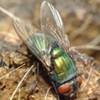Resumen
The common green bottle fly is a common visitor to carrion, feces, and garbage. Like many of the other blow flies, it plays an important role in forensic, medical, and veterinary science. Larvae or maggots help forensic scientists to determine the period of insect colonization as it relates to the time of death, aiding law enforcement in their investigations. Medical treatment using maggot therapy can help to heal infections that are otherwise incurable. Learn more in this 4-page fact sheet written by Matthew Anderson and Phillip E. Kaufman and published by the UF Department of Entomology and Nematology, October 2011. Reviewed September 2014.
Citas
Anderson GS. 2000. Minimum and maximum development rates of some forensically important Callophoridae (Diptera). Journal of Forensic Science 45: 824-832. https://doi.org/10.1520/JFS14778J
Apperson CS, Arends JJ, Baker JR, Carter CC, Payne CS. (2011). Blow flies. Insect and Related Pests of Man and Animals. http://ipm.ncsu.edu/ag369/notes/blow_flies.html (30 August 2011).
Australian Museum. (November 2009). Decomposition: fly life cycle and development times. http://australianmuseum.net.au/Decomposition-fly-life-cycles/ (30 August 2011).
Baldridge RS, Wallace SG, Kirkpatrick R. 2006. Investigation of nocturnal oviposition by necrophilous flies in central Texas. Journal of Forensic Science. 51: 125-126. https://doi.org/10.1111/j.1556-4029.2005.00022.x
Byrd JH, Castner JL. 2009. Insects of forensic importance. In Byrd JH, Castner JL (Editors), Forensic Entomology: The Utility of Arthropods in Legal Investigations (2nd Edition). pp. 43-45. CRC Press, Boca Raton, FL. 688 pp. https://doi.org/10.1201/NOE0849392153
Catts EP, Goff ML. 1992. Forensic entomology in criminal investigations. Annual Review of Entomology. 37: 253-272. https://doi.org/10.1146/annurev.en.37.010192.001345
Horobin AJ, Pritchard DI, Shakesheff KM. 2002. How do larvae of Lucilia sericata initiate human wound healing? European Cells and Materials 4 (Supplement 2): 69.
ITIS. (2011). Phaenicia sericata (Meigen, 1826). Integrated Taxonomic Information System. http://www.itis.gov/servlet/SingleRpt/SingleRpt?search_topic=TSN&search_value=151622&print_version=PRT&source=to_print (30 August 2011).
Rueda LC, Ortega LG, Segura NA, Acero VM, Bello F. 2010. Lucilia sericata strain from Colombia: Experimental colonization, life tables and evaluation of two artificial diets of the blowfly Lucilia sericata (Meigen) (Diptera: Calliphoridae), Bogota, Colombia strain. Biological Research. 43: 197-203. https://doi.org/10.4067/S0716-97602010000200008
Salimi M, Goodarzi D, Karimfar MH, Edalat H. 2010. Human urogenital myiasis caused by Lucilia sericata (Diptera: Calliphoridae) and Wohlfahrtia magnifica (Diptera: Sarcophagidae) in Markazi Province of Iran. Iranian Journal Arthropod-Borne Disease 4: 72-76.
Sherman RA, Hall MJR, Thomas S. 2000. Medicinal maggots: an ancient remedy for some contemporary afflictions. Annual Review of Entomology 45: 55-81. https://doi.org/10.1146/annurev.ento.45.1.55
Strikewise. (2007). Blowfly strike. http://www.strikewise.com/blowfly.html (30 August 2011).
Tarone AM, Foran DR. 2006. Components of developmental plasticity in a Michigan population of Lucilia sericata (Diptera: Calliphoridae). Journal of Medical Entomology 43: 1023-1033. https://doi.org/10.1093/jmedent/43.5.1023
Tarone AM, Foran DR. 2010. Gene expression during blow fly development: Improving the precision of age estimates in forensic entomology. Journal of Forensic Sciences 56: S112-S122. https://doi.org/10.1111/j.1556-4029.2010.01632.x
Whitworth T. 2006. Keys to the genera and species of blow flies (Diptera: Calliphoridae) of America north of Mexico. Proceedings of the Entomological Society of Washington 108: 689-725.

